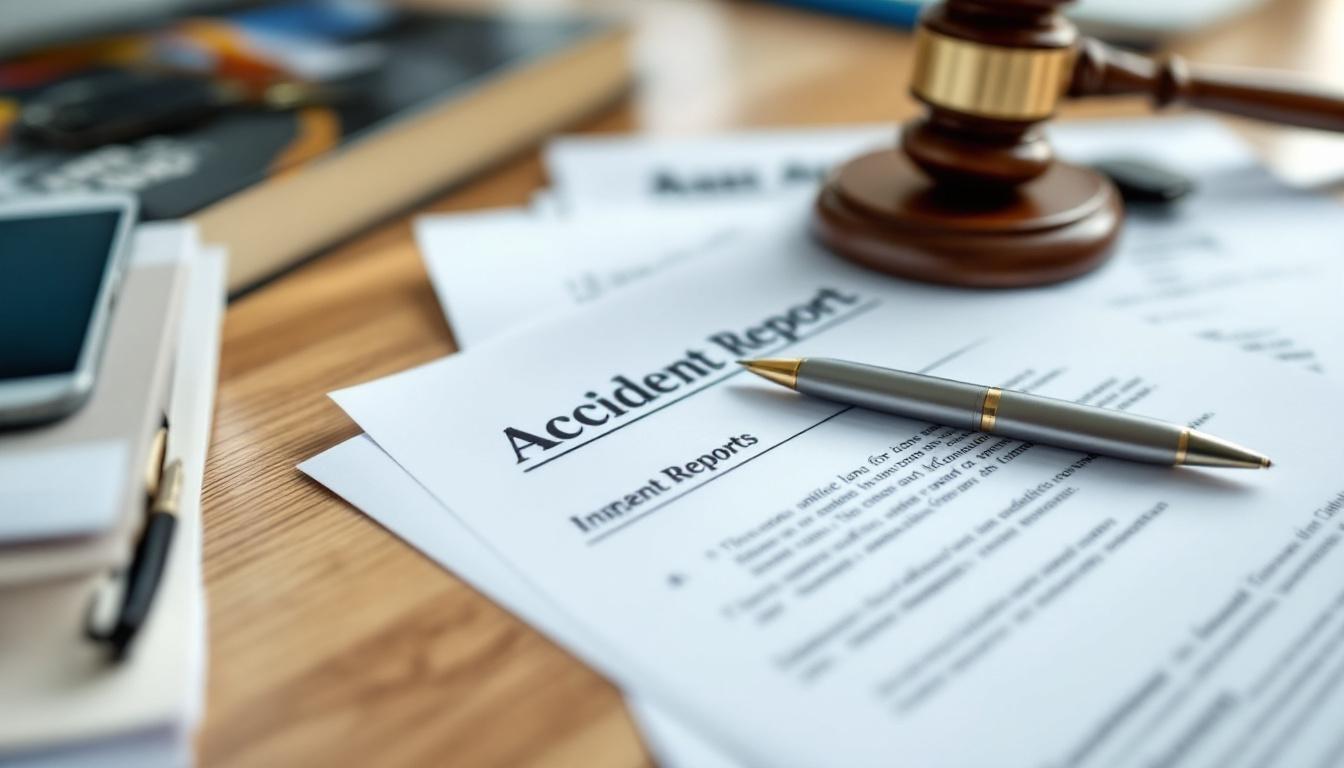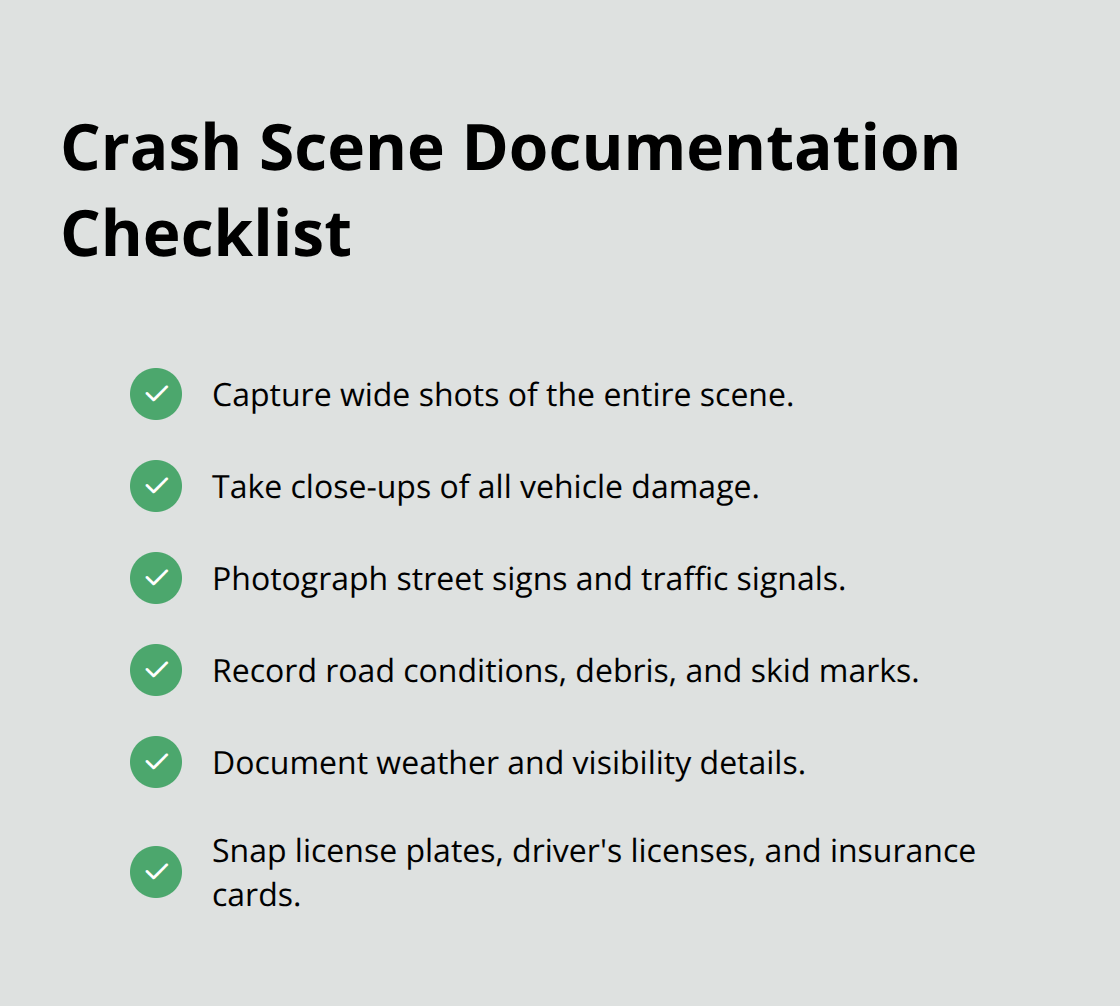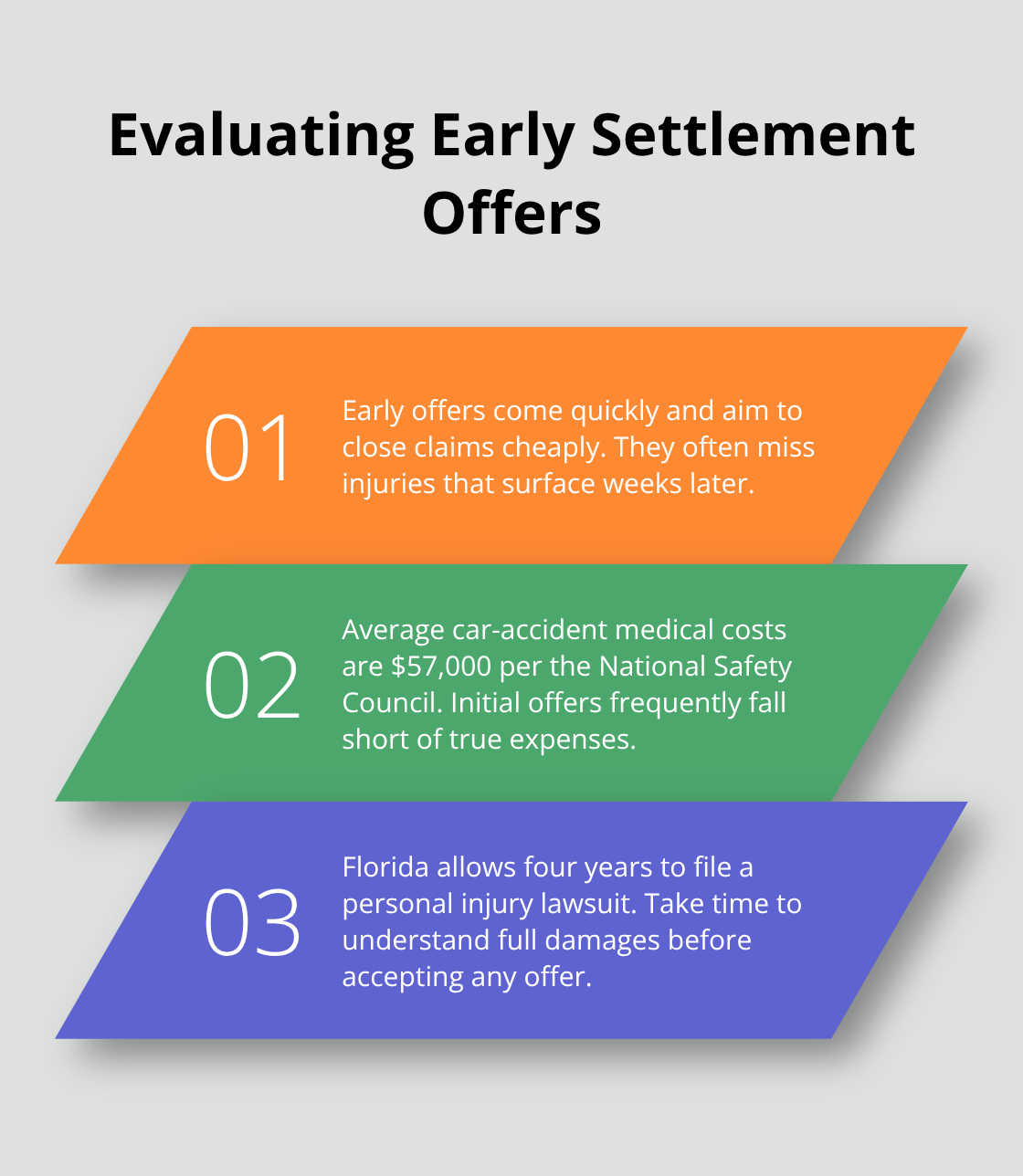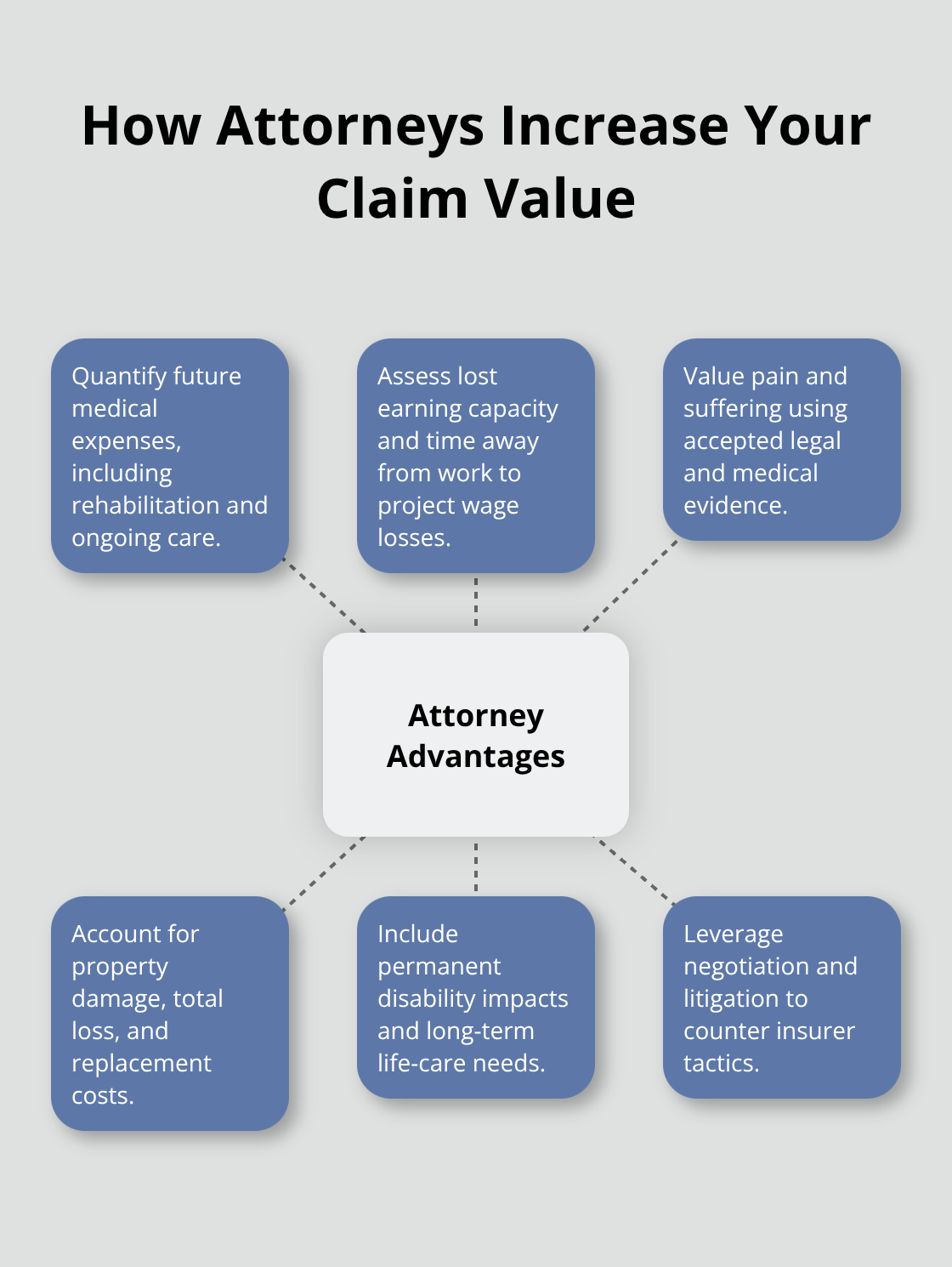What Legal Steps to Take After a Car Accident?
Our Blog
What Legal Steps to Take After a Car Accident?

Car accidents happen in seconds but can impact your life for years. The decisions you make immediately after a crash often determine whether you receive fair compensation for your injuries and damages.
We at Harnage Law PLLC know that proper legal advice for car accidents can mean the difference between a quick settlement and the full compensation you deserve. Taking the right steps protects both your health and your financial future.
What Should You Do at the Accident Scene?
Your first priority after any car accident is personal safety. Check yourself and passengers for injuries immediately. Even if you feel fine, adrenaline can mask pain and serious conditions. The National Highway Traffic Safety Administration reports that 38,680 motor vehicle fatalities occurred in 2020, which makes immediate medical assessment vital. Call 911 if anyone shows signs of injury, confusion, or pain. Move vehicles out of traffic lanes only if everyone can walk safely and the cars are drivable. Turn on hazard lights and set up flares or reflective triangles if available.
Document Everything Before Anyone Leaves
Take photographs immediately, even before you check on injuries if they appear minor. Capture wide shots that show the entire accident scene, then move to close-ups of all vehicle damage from multiple angles. Photograph street signs, traffic signals, road conditions, and any skid marks or debris. Weather conditions affect liability determinations, so photograph wet roads, ice, or poor visibility conditions. Get pictures of license plates, insurance cards, and driver’s licenses from all parties involved. The Florida Department of Highway Safety requires drivers to report crashes with injuries or damages over $500 (making thorough documentation essential for legal compliance).

Gather Contact Information Strategically
Exchange names, phone numbers, addresses, insurance company names, policy numbers, and driver’s license numbers with all drivers involved. Collect the same information from witnesses, as their testimonies can strengthen your case significantly. Never admit fault or discuss who caused the accident. Florida follows a comparative negligence system, which means fault percentages affect compensation amounts. Write down the exact time, location, and a brief description of how the accident occurred while details remain fresh in your memory. Request the officer’s name and badge number (you’ll need this information to obtain the police report later).
Protect Your Legal Position
Avoid statements that could harm your case later. Insurance adjusters often use casual comments against accident victims during settlement negotiations. Stick to basic facts when you speak with police officers and other drivers. The next step involves contact with insurance companies, where your words carry even more weight in determining your compensation.
How Do You Handle Insurance Companies After an Accident?
Contact your insurance company within 24 hours of the accident, as most policies require prompt notification. Florida law mandates reports for accidents with injuries or damages that exceed $500, but insurance companies often impose stricter deadlines. When you call, provide basic facts about the accident location, time, and parties involved, but avoid statements about fault or detailed discussions of your injuries. The Insurance Research Council found that accident victims who handle claims without legal representation receive settlements that are 3.5 times lower than those with attorneys. State only what you observed directly and request a claim number for future reference.
What Information You Should Share
Provide factual details about the accident scene, weather conditions, and vehicle damage without admitting fault or liability. Insurance adjusters train as negotiators who may ask leading questions that minimize your claim value. Stick to documented facts from your photos and police reports. Never sign documents or provide recorded statements without legal review. The adjuster may seem helpful, but their primary goal involves protecting their company’s profits, not maximizing your compensation.
How You Should Handle Settlement Offers
Insurance companies often present initial settlement offers within days of an accident, hoping to close claims quickly and cheaply. These early offers rarely reflect the true value of your damages (particularly when injuries may not fully manifest for weeks or months). Medical expenses for car accident injuries average $57,000 according to the National Safety Council, but initial offers frequently fall far below actual costs. Reject pressure tactics and demands for immediate decisions. Florida allows four years to file personal injury lawsuits, giving you time to understand your full damages before you accept any settlement.

When Professional Legal Help Becomes Necessary
Complex insurance negotiations often require legal intervention to protect your interests. Insurance companies employ teams of lawyers and adjusters who work to minimize payouts, while accident victims typically lack experience in claim negotiations. The gap in knowledge and resources creates an uneven playing field that favors insurance companies. Professional legal representation levels this field and helps accident victims understand when they need more than basic insurance claim assistance.
When Should You Contact a Personal Injury Attorney
Certain situations demand immediate legal representation, and delays cost you money. Contact an attorney within 72 hours if your accident involves serious injuries that require hospitalization, multiple vehicles, commercial trucks, or disputes over fault. The Insurance Research Council data shows unrepresented accident victims receive settlements that average $18,000, while those with attorneys average $77,600. This 331% difference reflects the insurance industry’s practice of offering minimal settlements to unrepresented claimants. Florida’s comparative negligence laws mean even partial fault can reduce your compensation significantly (making legal representation essential when liability disputes arise).
How Attorneys Maximize Your Compensation
Personal injury attorneys understand the true value of your claim beyond immediate medical bills. They calculate future medical expenses, lost earning capacity, pain and suffering, and property damage that insurance adjusters often minimize or ignore entirely. The National Safety Council reports average car accident medical costs reach $57,000, but attorneys identify additional damages like rehabilitation costs, permanent disability compensation, and lost future income.

Legal representation becomes vital when insurance companies deny valid claims, offer settlements below $25,000, or when your injuries prevent you from working for more than two weeks.
What the Legal Process Involves
The legal process begins with a comprehensive case evaluation where attorneys review medical records, police reports, and accident documentation to determine claim value. Your attorney handles all communication with insurance companies and prevents you from making statements that damage your case. Most personal injury cases settle within 6-18 months, but complex cases that involve severe injuries may require litigation. Florida’s four-year statute of limitations gives you time to understand your full damages, but earlier action strengthens your position. Attorneys work on contingency fees (meaning you pay nothing unless they win your case), which removes financial barriers to quality legal representation.
Signs You Need Professional Legal Help
Contact an attorney immediately if the insurance company denies your claim, disputes fault, or offers a settlement that seems unreasonably low. Medical complications that develop weeks after your accident often require legal intervention to secure proper compensation. Multiple insurance companies may become involved when accidents include commercial vehicles or multiple parties, creating complex negotiations that require professional guidance. Property damage exceeding $10,000 or total loss of your vehicle typically indicates a case that benefits from legal representation to maximize your recovery.
Final Thoughts
Car accidents create complex legal and financial challenges that demand immediate action and strategic decisions. The steps you take in the first 72 hours after a crash often determine whether you receive fair compensation or settle for far less than your claim’s true value. Documentation at the accident scene, careful communication with insurance companies, and prompt medical attention form the foundation of a strong claim.
Insurance companies employ trained negotiators who work to minimize payouts and create an uneven playing field for accident victims. Professional legal advice for car accidents becomes essential when serious injuries occur, fault disputes arise, or settlement offers seem inadequate. The Insurance Research Council’s data shows a 331% difference in settlements between represented and unrepresented claimants (which demonstrates the financial impact of proper legal guidance).
Time works against accident victims who delay action. Florida’s comparative negligence laws and insurance company tactics make early legal consultation a smart financial decision. We at Harnage Law PLLC help accident victims navigate these complex situations and fight for the compensation they deserve.
